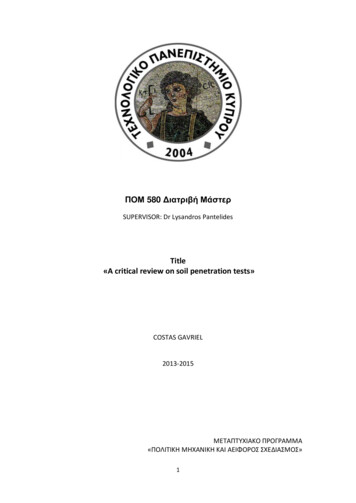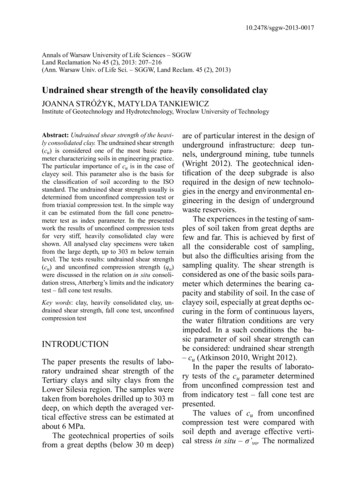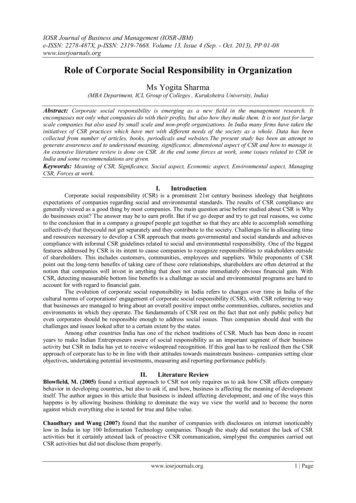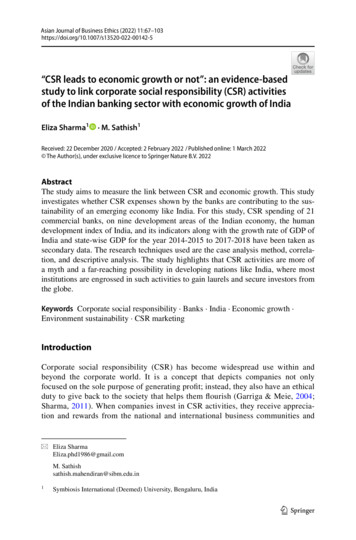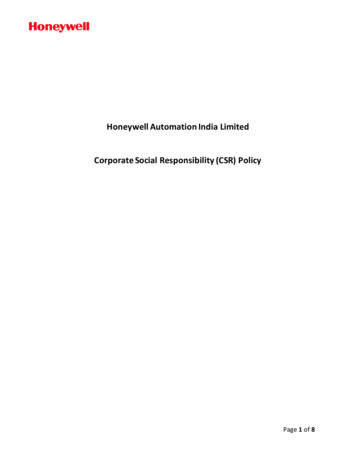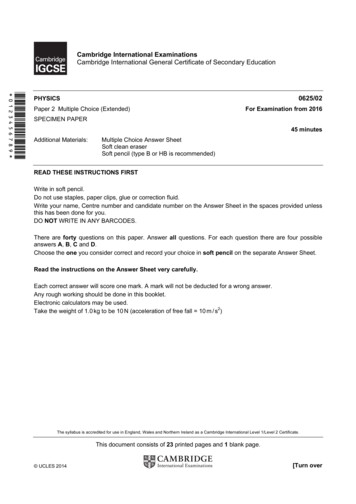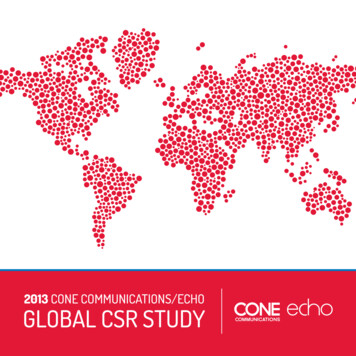
Transcription
2013 CONE COMMUNICATIONS/ECHOGLOBAL CSR STUDY2013 CONE COMMUNICATIONS/ECHO GLOBAL CSR STUDY 1
ContentsIn this new era of CSR, the need for companiesto articulate progress beyond CSR purposehas never been ations30Global ConsumerResponsibility Segmentation56Conclusion62Acknowledgements64About Cone Communicationsand Echo66Issues10Approach14CSR as a Differentiator18Consumer Responsibility22Country Snapshots 36-55CANADA 38united states 36u.K. 42Russia 48France 46ChiNa 50Germany 44Japan 54BRAZIL 40India 5222013 CONE COMMUNICATIONS/ECHO GLOBAL CSR STUDY 1
Corporate social responsibility is no longeran option — it is emphatically and indisputablya must-do.The 2013 Cone Communications/Echo Global CSR Study and conversationswith global experts make one thing abundantly clear: the question isnot whether companies will engage in corporate social responsibility,but how they will create real and meaningful impact. Corporate socialresponsibility is no longer an option — it is emphatically and indisputably a must-do.Today’s consumers are savvier, more sophisticated and more connected than ever before.Cognizant of their own capacity to influence social and environmental issues, they arelooking more closely at the collective impact of corporations and individuals. In this newera of CSR, the need for companies to articulate progress beyond CSR purpose hasnever been greater. And although nuances certainly exist from market to market, thefindings and insights from this report carry universal implications for companies:E Define the New Business Case.The CSR ROI has always been hotly debated, but this research definitively asserts CSRas an essential reputation strategy. Companies that fail to recognize CSR’s power beyondthe shopping aisle are taking a myopic view. It is a formidable influencer of trust, affinityand loyalty. Companies must participate in CSR with authenticity and transparency, or riskdoing more harm than good to their reputation.E Lead with Innovative Approaches.Global experts agree that leading companies are doing more than analyzing the waytheir businesses operate — they are exploring new models that value long-term societalneeds. From collaborating with competitors to address broader industry issues, toadvocating for comprehensive public policy changes, businesses are beginning torecognize that their own viability depends on social and environmental sustainability.22013 CONE COMMUNICATIONS/ECHO GLOBAL CSR STUDY 3
About the Research:E Embrace Social Media.Social media is transforming the CSR landscape, especially in countries suchCone Communications partneredas China, India and Brazil, where more than eight-in-10 consumers are usingwith Echo Research to field oursocial channels to engage with companies around social and environmentalsecond comprehensive surveyissues. Citizens are universally taking to social channels to learn more aboutof global attitudes, perceptionsissues, share positive and negative information and influence their personaland behaviors around CSR. Wenetworks. Companies must recognize social media as a powerful tool withconducted an online survey ofequal ability to lend advantage or peril.10,287 consumers in 10 of thelargest countries in the world byE Communicate the CSR Return.GDP, including the United States,Despite certain pockets of optimism, the research shows that mostCanada, Brazil, the United Kingdom,consumers are not seeing significant corporate impact on pressing social andGermany, France, Russia, China,environmental issues. With brand credibility and affinity on the line, companiesIndia and Japan. We broadlymust come to terms with the gap between corporate actions and consumerdescribed “corporate socialperceptions. Companies need to consistently and transparently communicateresponsibility” to respondentstheir CSR progress and return in the channels their consumers are using.in each country as “companieschanging their business practicesE Make It Personal.and giving their support to helpRobust regulations or retailer choice editing may mean advanced CSRaddress the social and environmentalenvironments in countries such as Germany, France and the U.K., but alsoissues the world faces today.”result in less-engaged consumers. However, these consumers are not beyondreach, and CSR can still be a differentiator. The key is to make CSR personallyrelevant. Our research reveals distinct consumer personalities with associatedpreferences and motivations for engaging in social and environmentalissues. Marketers who understand their consumers’ motives will be able tocommunicate the right return, and be well-positioned to deliver CSR impact.4The question is not whether companies willengage in corporate social responsibility, but howthey will create real and meaningful impact.2013 CONE COMMUNICATIONS/ECHO GLOBAL CSR STUDY 5
31%ExpectationsToday, “business as usual” is anything but. The traditional model in whichbusiness exists solely to generate profits has changed. Now, companies arestill expected to be profitable, but they are also expected to be an activeparticipant — if not a driving force — in solving our world’s most urgent socialand environmental challenges.of global consumersbelieve businessesshould changethe way theyoperate to align withgreater social andenvironmental needs.Consistent with our 2011 findings, in 2013 just 6percent of consumers believe the singular purposeof business is to make money for shareholders,while the clear majority expects companies to domore than play a limited role in communities or simply donatetime and money.Savvy consumers recognize that real and lasting changecomes not from add-on initiatives, but instead as a result ofmeaningful shifts in operations, supply chain and the very waybusiness is conducted. One-in-three (31%) global consumersbelieve businesses should change the way they operate toalign with greater social and environmental needs, and ninein-10 want companies to go beyond the minimum standardsrequired by law to operate responsibly and address social andenvironmental issues.62013 CONE COMMUNICATIONS/ECHO GLOBAL CSR STUDY 7
EXPECTATIONSBeliefs about theBeliefs about the role of business in society:role of businessin society:6%13%31%Businesses may play a limitedrole in the communities inwhich they are based, but arenot necessarily responsiblefor supporting social orenvironmental issuesBusinesses should changethe way they operate toalign with greater social andenvironmental needsBusinesses should not onlysupport but advocate forchange in larger social orenvironmental issuesby increasing awarenessof the issue and donatingproducts or services,money or volunteeringBusinesses exist to makemoney for shareholders andare not responsible forsupporting social orenvironmental issues21%29%Businesses should supportlarger social or environmentalissues by donating productsor services, money orvolunteering85%China and Russia are theleast acquiescent of CSRflaws, where 79 percentof both populations willtolerate imperfection (vs.85% globally).Consumers’ high expectations ofcorporate social responsibilityof this year’srespondents say it’sokay if a company isnot perfect, as longas it is honest aboutits efforts.Though expectations are high, thereis a deep appreciation that CSR is ado not rest exclusively in operations,journey, and no company is withouthowever. Their appetite for social andflaws. Eighty-five percent of this year’senvironmental issue support is strong,respondents say it’s okay if a company isand they want to see CSR not onlynot perfect, as long as it is honest aboutin back-end processes but infused inits efforts. However, businesses shouldthe very products and services thosenot take that tolerance for granted, ascompanies offer. Consumers want to beit declined 3 percentage points froma part of CSR efforts, and purchasing88 percent in 2011. Companies mustis largely their opportunity to do so.candidly communicate where they are inToday, 93 percent wants to see morethat journey. Today, with the informationof the products, services and retailersflood gates wide open, and the worldthey use support worthy social and/orstill reeling from corporate scandals andenvironmental issues.improprieties, we may be on the vergeBrazil is the country mosteager for wholesale change.An emerging world power, halfthe population — nearly doublethe global average — believesbusinesses must go beyondthe bottom line to make theworld a better place.of intensifying consumer scrutiny ofcorporate behavior.82013 CONE COMMUNICATIONS/ECHO GLOBAL CSR STUDY 9
19%ISSUESConsumers demand companiesbe at the table to help solvecritical social and environmentalissues. And they are laserfocused on where companiesshould concentrate their efforts.of consumers mostwant companiesto address theenvironment —preserving andprotecting our naturalresources.Once again, economic development (38%) is far andaway the most pressing issue citizens want companiesto address, increasing four percentage points since2011. This comes as no surprise as the world strugglesto recover from one of the worst financial crises in history.From the Eurozone disaster, to theThe environment (19%), humanU.S. mortgage debacle, all eyes arerights (11%) and poverty and hungeron individual wallets and livelihood.(11%) are the next most importantEconomic development is also aissues consumers want companies tomacro issue companies are well-suitedtackle, and logically so — these issuesto address, leading the charge to liftare related to a company’s operations.countries out of turmoil and onto theConsumers understand companies areroad to sustainable recovery through jobuniquely positioned to make real impactscreation and infrastructure development.on these issues — from how they sourcematerials to their labor standards.102013 CONE COMMUNICATIONS/ECHO GLOBAL CSR STUDY 11
ISSUESThe ONE issue consumers most wantcompanies to address:WATERpreserving and providingaccess to clean waterHEALTH AND DISEASEpreventing and treatingdisease, e.g., HIV/AIDS orcancer, and ensuring properchild and maternal healthEDUCATIONensuring equal accessto quality educationHUMAN RIGHTSensuring the rights ofworkers, children,women and othersfacing injustice12education (9%) and health andAs they are united in what issues(50%) of the citizens of this rapidlydeveloping nation believe companiesdisease (8%), are not to be discounted.are also aligned on where that impactshould focus their impact globally. InAlthough consumers respect thatshould center. Around the world, citizensstark contrast, France appears to becompanies alone cannot solve thesestill want to feel companies’ CSR effortsturning its focus inward. In 2013, 45complex issues, their importance cannotclose to home, with the quality of lifepercent of French citizens indicate abe underestimated. These issues arelocally (37%) and nationally (35%) virtuallystrong preference for national impact, upembedded within the macro issue oftied as priorities, followed by quality of life11 percentage points from 2011, and38%economic development, and there isglobally (28%).reversing their previous conviction34%expect companies to contribute toBrazil represents a significant outlierbroader efforts to improve all aspectswhen it comes to where companies’of society.CSR effects should concentrate. Halfno question consumers unequivocally21%8% 8%9%12%11%Other critical social issues, such ascompanies should address, consumers4% 6%9%THE ONE ISSUECONSUMERS MOSTWANT COMPANIESTO ADDRESS11%11%19%ECONOMICDEVELOPMENTinvesting in communitiesthrough people, jobcreation and infrastructureENVIRONMENTpreserving and protectingour natural resourcesPOVERTY AND HUNGERproviding financialassistance, food and housingto people in great need11%of consumers mostwant companiesto address humanrights — ensuringthe rights ofworkers, children,women and othersfacing injustice.Arguably the epicenter of globalization,that companies should prioritizeglobal impact.In the U.S., where financialupheaval has drastically alteredstandards of living and employmentnationwide, poverty and hunger(14%) edges out the environment(13%) as the second highest priorityissue — a reversal of 2011 results.2013 CONE COMMUNICATIONS/ECHO GLOBAL CSR STUDY 13
APPROACHMore than ever, companies do not operatein a vacuum, and the trickle-down effects ofincreasing production or expanding into newmarkets are acutely felt by the world’s citizens.As issue and impactcontinue to want companies to bepriorities remainengaged in broader, external issues,consistent with our 2011they also expect companies to lookfindings, so too doeswithin their own processes to identifythe universal demand for change.areas for improvement and progress.Consumers today recognize that theGlobal consumers say the number onegreatest opportunity for impact startsway they want companies to approachat the very core of a company: itstoday’s most critical issues is to changeoperations. And although consumersthe way they operate (30%).18%of global consumerscall out newproduct or servicedevelopment asthe one approachcompanies shouldtake to positivelyaffect social andenvironmentalissues.14The United Kingdom is theregion most interestedin wholesale change, wheretwo-in-five (41%) citizensindicate operational change isthe preferred path forward.2013 CONE COMMUNICATIONS/ECHO GLOBAL CSR STUDY 15
APPROACHInnovation remains critical as well,with nearly one-fifth (18%) ofOther approaches ranked high inindividual countries. India shows aglobal consumers calling out newstrong proclivity for knowledge sharing,product or service development aswhere 24 percent of Indians most wantthe one approach companies shouldcompanies to raise awareness for andtake to positively affect social andeducate around an issue. And as theenvironmental issues. In China andcountry that pioneered broad-basedJapan, where invention and technologyphilanthropy, the United States holds fasthave long played defining roles into traditional corporate approaches toeconomics and culture, productissue engagement. Americans are nearlyinnovation is particularly importanttwice as likely as their global peers (13%(26% and 30%, respectively).vs. 7%) to want companies to focus onThe ONE approachto addressing socialand environmentalissues that consumerswould like to seecompanies take:The one approach to addressing social and environmentalissues that consumers would like to see companies take:30%31%5%making donations.DONATE the timeand expertise of theiremployees5%Americans are nearlytwice as likely as theirglobal peers to wantcompanies to focus onmaking donations.16APPLY their unique businessassets, such as technologyand research, to speedsolutions to social andenvironmental problemsRAISE awareness for anissue and educate theirconsumers and employees16% 18%7% 7%MAKE donations in the formof cash or products/services13% vs 7%CHANGE the way theyoperate, for example sourcingmaterials more responsibly orreducing the environmentalimpact of their factories16%19%11%11%12%11%DEVELOP a new product orservice (or enhance anexisting one) that can helpsolve a social issue or is lessharmful to the environment(2013) / help solve a social orenvironmental need (2011)SEEK feedback from ordevelop partnerships withkey stakeholders aroundsocial and environmentalissues, for example withgovernment agencies,nonprofits or other companies2013 CONE COMMUNICATIONS/ECHO GLOBAL CSR STUDY 17
W91%hen companies supportof global consumersare likely to switchbrands to oneassociated with agood cause, givencomparable priceand quality.social or environmentalissues, consumer affinityoverwhelmingly upsurges.Nearly all consumers say that when companiesengage in CSR, they have a more positive imageof the company (96%), would be more likely toCSR AS ADIFFERENTIATORCSR remains a powerful differentiator, influencingboth consumer behavior and corporatereputation. The business case for CSR remainsextremely compelling, particularly as companiesbattle ever-increasing competition and decliningconsumer confidence.18trust that company (94%) and would be moreloyal to that company (93%).No longer merely a transactionalassociated with a good cause, givenand services is no longer a foregoneproposition, the benefits of CSR extendcomparable price and quality. However,conclusion.far beyond a brand halo. In the fightthere are signs that conviction mayfor talented employees, as well asbe waning.license to operate, CSR is once againWith CSR now mainstream andincreasingly an expected brand attribute,In most countries we studied,consumers are surrounded by a plethoraa significant consideration in a varietyconsumers are slightly less resolute inof products and services with social andof individual decisions, including wheretheir principles of shopping for a cause.environmental claims. Choosing what toto work (81%), which companies theyThe number of consumers who indicatedbuy is not simply about finding a productwant in their communities (85%), what tothey were “very likely” to opt for awith a CSR benefit — it’s about selectingbuy or where to shop (87%) and whichbrand affiliated with a cause decreasedthe product whose claim or associationproducts or services to recommendby 5 percentage points, sliding downis most meaningful to the consumer.to others (85%).the scale of engagement to the lessToday, to differentiate, companies needcommittal “somewhat likely.” Althoughto deliver clear information about thethe shopping aisle — in fact, nine-in-10consumers continue to express anissue, as well as the expected individualglobal consumers are, as they were inundeniably strong preference for cause,and collective impact.2011, likely to switch brands to onetheir purchase of such affiliated productsAnd CSR remains a differentiator in2013 CONE COMMUNICATIONS/ECHO GLOBAL CSR STUDY 19
CSR AS A DIFFERENTIATORGiven similar price and quality, consumers arelikely to switch brands to one that is associated with a good ers consider a company’s social and environmentalcommitment before making important decisions:VERY/SOMEWHAT Important (net)VERY Important35%87%32%33%What to buy orwhere to shop81%Where to work85%23%20VERY/SOMEWHAT likely (net)NOT VERY/NOT AT ALL likely (net)VERY likelyNOT VERY likelySOMEWHAT likelyNOT AT ALL likelyWhich companies youwant to see doing business inyour community32%67%85%Which stocks or mutualfunds to invest inWhich products and services torecommend to people2013 CONE COMMUNICATIONS/ECHO GLOBAL CSR STUDY 21
88%Whether buying an item theybelieve is better for theenvironment, or not buyingan item because of themanufacturer’s business practices, whatNearly nine-in-10consumers feel aresponsibility topurchase productsthey think are sociallyand environmentallyresponsible.happens at the register is often more thanCONSUMERRESPONSIBILITYFor most consumers,purchasing is theirpoint-of-entry forengaging in corporatesocial responsibility.22just a transaction. It’s a stake in the ground.Across all countries, consumersthat sense of accountability doesn’thalf (55%) have reported refusing topredominantly believe they play a rolealways come to fruition. Around thepurchase in the last year.in addressing social and environmentalworld, consumers show a propensityissues through their purchases. Theto want to be engaged in CSR throughregister, more than three-quarters ofvast majority — 88 percent — feelspurchasing, but higher-touch efforts likeconsumers continue to say they areaccountable for buying products andgiving their time and money are a morewilling to engage with companies in aservices they believe are responsible.challenging proposition.variety of ways if given the opportunity,A mere 13 percent believes theirIt’s evident that shopping with aWhen it comes to action beyond thesuch as donating, volunteering, voicingpurchases don’t play any role in theseconscience persists as a global mindset.opinions to companies and tellingtypes of issues.Ninety-two percent of consumers sayfriends and family about a company’sthey would buy a product with a socialCSR efforts. The dramatic gap betweenbuy responsibly only go so farand/or environmental benefit if given theconsumer desire and action represents— individual action is where thatopportunity, and two-thirds (67%) havean untapped opportunity for companiesresponsibility manifests. Disparitiesactually done so in the last 12 months.to engage and enlist new and existingbetween consumers’ intendedOn the flipside, 90 percent of consumerssupporters who stand ready, willing andbehaviors and reported actions revealsay they would boycott, and more thanable to join their efforts.However, feelings of obligation to2013 CONE COMMUNICATIONS/ECHO GLOBAL CSR STUDY 23
CONSUMER RESPONSIBILITYIn the past 12 months,consumers indicate they have:Consumers want to get engaged with corporatesocial responsibility efforts:Bought a product with a social and/or environmental benefitIf given the opportunity, I would buy a product with a social and/or environmental benefit67%92%Boycotted (refused to purchase) a company’s products/services upon learning it behaved irresponsiblyIf I learned of a company’s irresponsible or deceptive business practices, I would stop buying its products55%90%Told friends or family about a company’s corporate responsibility effortsI would tell my friends and family about a company’s CSR efforts50%84%Made a donationIf given the opportunity, I would donate to a charity supported by a company I trust60%78%If given the opportunity, I would voice my opinion to a company about its corporate social responsibility efforts(e.g., provide comments on the company’s website or blog, review products)Given their opinions and feedback about a company’s responsibility efforts directly to the company78%32%VolunteeredIf given the opportunity, I would volunteer for a cause that a company I trust supports77%Percent Who Strongly/Somewhat Agree (Net)37%Researched a company’s business practices or support of social and environmental issues34%242013 CONE COMMUNICATIONS/ECHO GLOBAL CSR STUDY 25
30%of Chinese consumersbelieve companieshave had significantpositive impacton social andenvironmental issues.IMPACTAround the world, the majorityof consumers feel both individualsand corporations are having somedegree of positive influence onsocial and environmental issues;however, just one-quarter feelseither is making a significant impact.26Belief in individual empowerment varies by market,with emerging countries such as Brazil (57%)and India (52%) indicating a strong conviction ofsubstantial personal impact through purchasing,versus only 14 percent in the United Kingdom.Similarly, consumer confidence in theconsistently communicate both consumerimpact companies have had on socialand corporate CSR results. Regardless ofand environmental issues differs. Thirtythe country, the global population wantspercent of citizens in China, for example,to understand how the myriad CSR effortsfeel companies are creating the greatestmake real and tangible differences. Toimpact, compared to just 12 percent ofbuild trust and deeper engagement, it willcitizens in France.be critical for companies to showcaseLooking in tandem at the varyingcollective return — both from theirdegrees of perceived individual andown programs as well as those actionscorporate impact underscores thetaken by consumers, from purchasingoverwhelming need for companies toto advocating.2013 CONE COMMUNICATIONS/ECHO GLOBAL CSR STUDY 27
IMPACTWho’s Driving Positive Impact?Around the world, varying degrees of perceived individual and corporate impactunderscore the overwhelming need for companies to consistently communicateboth corporate and consumer CSR return.COMPANIEShave made a significant positive impacton social and environmental issuesCONSUMERScan have a significant positive impactthrough the purchasing decisionsthey %25%21%57%14%24%25%20%11%52%17%2013 CONE COMMUNICATIONS/ECHO GLOBAL CSR STUDY 29
91%88%of globalconsumers wantto hear aboutCSR effortsCOMMUNICATIONSN70%ine-in-10 (91%) global citizens areresponsibility initiatives and progress,but for that communication to resonate,messages must be honest and clear.information about their CSR efforts, but30are confusedby CSRmessageseager to hear about corporate social 88% believe companies share positiveWith universally high expectationsand an unquenched thirstfor understanding impacts,communicating CSR efforts and returnhas never been more important.believe companiesonly sharethe positivewithhold negative information. 70% are confused by the messages companiesuse to talk about their CSR initiatives.Chinese consumers are enthusiasticallylooking for help from companies whenit comes to CSR communications. Nearlyall (97%) want to hear how companiesare supporting social and environmentalissues, while eight-in-10 report beingconfused by CSR messages.2013 CONE COMMUNICATIONS/ECHO GLOBAL CSR STUDY 31
COMMUNICATIONS24%Most effective communication channelsfor informationabout social andMost effective communication channelsfor informationenvironmental programs and products:of global consumerssay the best channelto reach them withCSR messages is onthe product or itspackage or label.about social and environmental programs and products:24%CELL/MOBILE PHONETHROUGH THE MAILCOMPANY-SPONSOREDCOMMUNITY EVENTS(e.g., charity walk or concert)IN STORE(e.g., store employeesor in-store sign)SOCIAL MEDIA(e.g., Facebook or Twitter)4%6%ON THE PRODUCTor its package/label22%3%6%21%18%7% 9%8%MEDIA(e.g., stories andinterviews inthe local paper)Integrated communications will be critical to effectivelyreach consumers.ADVERTISING(e.g., print, broadcastor online)6%7%9%11%11%16%15%ON THECOMPANY’S WEBSITETraditional channels continue to reignOnline and mobile channels provide ansupreme when it comes to reachingemerging, not-to-be-ignored opportunityconsumers, with on-pack (24%), infor companies’ CSR communications,the media (18%) and advertising (15%)representing 24 percent of the preferreddeemed the most effective conduits forchannels, when corporate websites,CSR communications.social media and mobile phones areviewed in concert.322013 CONE COMMUNICATIONS/ECHO GLOBAL CSR STUDY 33
COMMUNICATIONSSocial media is transforming the face of CSR, as citizensHow consumers use social media (e.g., Facebook, Twitter)How consumersuse social media (e.g.,to address and/or engage with companiesaroundFacebook, Twitter) to address and/orengage with companies around socialsocial and environmental issues:worldwide have unprecedented access to information — viawebsites, blogs and apps — about corporate behavior.They are poised, smartphones inmobile-savvy and emerging countrieshand, to not only engage withChina, India and Brazil, where 90companies around vital issues but alsopercent, 89 percent and 85 percent ofserve as CSR megaphones, equallythe respective populations report usingpropagating commendation andsocial media to engage with companiescondemnation. Nearly two-thirds (62%)around their CSR efforts.of global consumers report using socialand environmental issuesTo share positiveinformation aboutcompanies and issues Icare about with peoplein my network34%But if China, India and Brazil are socialmedia to engage with companies aroundmedia boom-towns, the U.K. is a ghostsocial and environmental issues — andtown. Fewer than half — just 42 percentmostly to the benefit of companies, with— say they use social media to addressthe majority of citizens taking to social toor engage with companies around socialshare positive information (34%). Muchand environmental issues.353025of that usage is happening in highly2062%of global consumersreport using socialmedia to engagewith companiesaround social andenvironmental issues.34To learn more aboutspecific companiesand issuesTo share negativeinformation aboutcompanies and issues Icare about with peoplein my network29%To contribute directly toan effort led by acompany (e.g., pledge,volunteer, donate)18%26%To directly communicate with companiesaround issues16%To recruit others in mynetwork to contributedirectly to an effort ledby a company14%1510502013 CONE COMMUNICATIONS/ECHO GLOBAL CSR STUDY 35
COUNTRY SNAPSHOTThe United States is in lock-step with the global populationin its expectation for companies to do more than ensure ahealthy bottom-line. But unlike their global peers, there’sno consensus in how Americans believe companies shouldaddress social and environmental issues — just as long as businessesare at the table of these critical discussions. Citizens think businessesshould support (25%) CSR issues, if not also advocate for change (25%)— but they are almost as likely to consider community assistance (22%)or operational change (21%) as viable avenues for impact.CSR remains a powerful driver of brand affinity and reputation.Nine-in-10 American consumers say they not only have a morepositive impression of companies that support CSR (93%), but theyare also more likely to trust (90%) and be more loyal (90%) to thoseUNITEDSTATEScompanies. Americans feel a deep sense of responsibility to make theworld a better place and are actively participating in CSR efforts suchas making donations (65% vs. 60% globally) and volunteering (42%vs. 37% globally).However, U.S. citizens are slightly less swayed by CSR commitmentsin their everyday purchasing decisions, such as what to buy or where toshop (82% vs. 87% globally) or selecting products associated with socialor environmental benefits (88% vs. 92% globally). They are increasinglydiscerning and laser-focused on impact, and are somewhat uncertainabout the effectiveness of CSR programs. Just 16 percent thinkscompanies have had a significant positive impact on CSR issues, versusRole of ConsumerBuy responsible products ifconvenient (40%)Desired ReturnPositive impact on soci
Companies that fail to recognize CSR's power beyond the shopping aisle are taking a myopic view. It is a formidable influencer of trust, affinity and loyalty. Companies must participate in CSR with authenticity and transparency, or risk . eager for wholesale change. An emerging world power, half the population — nearly double the global .

